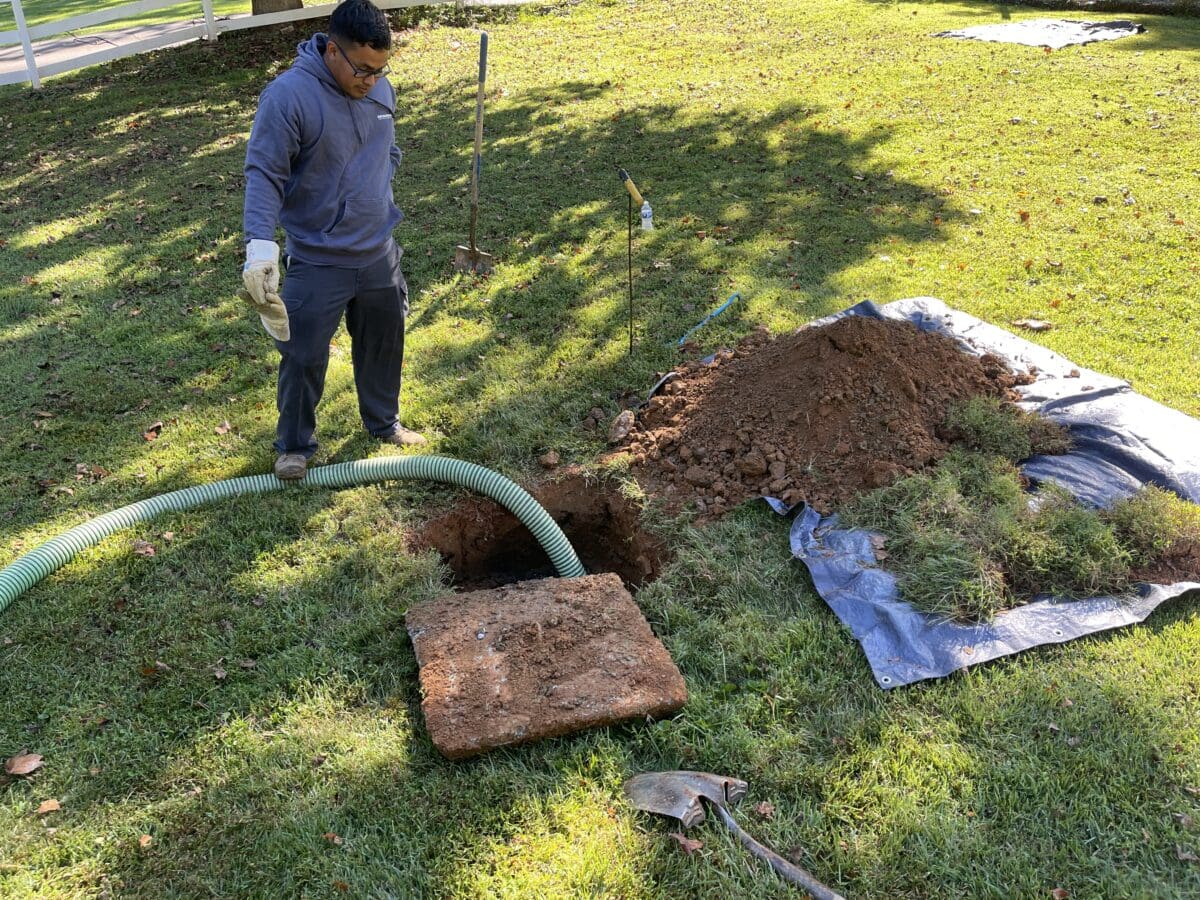
What are the 3 Types of Septic Systems?
Septic systems manage all household wastewater in areas not connected to centralized sewer systems. Understanding the different types of septic systems available can help homeowners be informed when working with a septic engineer for their septic installation, maintenance, and overall wastewater management.
There are three primary types of septic systems: Conventional Septic Systems, Alternative Septic Systems and Discharging Systems. Each system has its unique advantages and challenges, making it essential to understand the differences, or understand why not all of them are options for your lot. In addition, if you’re buying an existing house on septic, it’s important to understand the three primary types of septic systems when making informed decisions about a purchase.
Conventional Septic Systems
Conventional septic systems are the most commonly used type and consist of a septic tank and a drain field. The septic tank, typically made of concrete, fiberglass, or polyethylene, collects and partially treats household wastewater. The solids settle at the bottom, forming sludge, while the lighter materials like oils and grease float to the top, forming scum. The liquid effluent in the middle layer flows into the drain field, where it undergoes final treatment by infiltrating through the soil and being renovated by good aerobic processes.
Conventional septic systems have both a simple design and installation process. Typically, they have a lower initial cost compared to other systems and a proven effectiveness for many residential properties. However, conventional septic systems are not suitable for all soil types and site conditions. They require regular maintenance pumping to prevent system failure. There is also the potential for groundwater contamination, back ups into the house or sewage surfacing if not properly maintained.
Alternative Septic Systems
Alternative septic systems are similar to conventional systems in that most have a septic tank and some sort of drainfield. However, Alternative systems also incorporate additional treatment prior to the drainfield, a pressure dosed drainfield or both. Alternative septic system designs offer advantages such as reduced area requirements and greater flexibility in location on lots with good soils and especially in areas with poor soil conditions or high groundwater levels.
Some lots will not support a conventional system so an alternative system is the only option. Some drawbacks to alternative systems are that they may have higher initial installation and require semi-annual or annual inspection and service that must be reported to the health department. Electricity is usually required and there are more parts to maintain, therefore they are more expensive to operate.
There are very specific requirements for alternative sewage systems in Virginia and required septic tank pump outs in the Chesepeake Bay Act areas of Virginia which are the strictest in the nation.
Discharging Systems
When your lot will not support a conventional or alternative system due to site and soil conditions, an alternative discharging system may be an option. Since discharging systems do not use a drainfield, there are more regulations that come into play when discharging treated sewage into a ditch, stream or river. Some laws and ordinances prohibit new or repair discharge systems outright. So, discharge may not always be an option.
All the things discussed above related to alternative systems apply with the exception that there is no drainfield. After leaving the treatment system and going through disinfection, the treated effluent is discharged into a ditch, stream or river. O&M costs are higher as quarterly inspections are advised as well as semi-annual field testing and annual lab testing of the treated effluent.
Choosing the Right Septic System
Which septic system will work best for your lot depends on various factors, including soil type, groundwater levels, property size, and local regulations. It is required to utilize a professional septic service provider to assess your property’s specific needs and design and install the most suitable system. Properly evaluating these factors ensures the longevity and efficiency of your septic system.
Why Hire a Properly Licensed Septic Company
Hiring a properly licensed septic design and service company offers numerous benefits. Properly licensed companies have the knowledge and experience to design, install, and maintain various types of septic systems. They can also ensure that your septic system complies with local regulations and environmental standards. Professional septic servicing companies also offer scheduled maintenance services to help prevent system failures and costly repairs.
Septic companies must hold State licenses to perform services. In order for the company to be licensed, one of the owners must hold personal licenses as a master operator or a master installer. All of the counties in Northern VA we operate in also require a local license county by county.
At Advantage Septic, we have more combined experience in all facets of the septic industry and more properly licensed staff than anyone competitor in our area. We handle all aspects of your job with in house employees.
By hiring a professional septic service company like Advantage Septic, you can ensure your system’s proper installation, maintenance, and long-term efficiency. Contact us today to learn more about our services and how we can help you maintain a reliable septic system.
